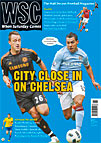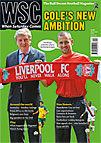 Saul Pope follows offical attempts to control rising racism in the Russian Premier League, which are proving ineffective and ill-targeted
Saul Pope follows offical attempts to control rising racism in the Russian Premier League, which are proving ineffective and ill-targeted
The first phase of the Russian season has been a busy one but unfortunately most of the action has involved incidents in the crowd rather than excitement on the pitch. In 15 rounds fans have twice racially abused Anzhi Makhachkala’s Roberto Carlos with bananas, and other black players with monkey noises. Zenit, Spartak and Dinamo Moscow supporters have torn out seats, fought the police and thrown fireworks at several venues. There has also been tension between Moscow sides and the newly powerful teams from the Caucasus.
The problems are not new but they are on the increase. The most disappointing aspect has been the failure of the football authorities to find an adequate way of dealing with them. It is disappointing, yet to Russian football fans not surprising.
The Russian Football Union (RFU) regularly fines clubs whose fans have offended, but seems impotent when it comes to punishing individuals – and much less powerful than the clubs themselves. The identities of those who abused Roberto Carlos remain a mystery. Following the first incident at Zenit St Petersburg, RFU president Sergey Fursenko told the press it was “essential that Zenit seek out this perpetrator, prevent him from coming to matches, and give [us] his name and place of work”. He suggested this would teach like-minded people a lesson, but Zenit didn’t agree – the club claimed to have found and disciplined the racist, but wouldn’t reveal his name “for his own safety”.
An image of the fan who threw a banana at Roberto Carlos at Krilya Sovetov three months later was published just hours after the incident. Fursenko said he would be immediately brought to justice and the Premier League’s security director said they would get his name. He is still at large.
Part of the problem is that current laws are outdated. A new “fans’ law”, which would make it possible to blacklist individual troublemakers, was first mentioned more than two years ago in WSC 265 and is supposed to be enacted later this season. Fan groups – who get the blame for much of the trouble at stadiums – are opposed, fearing the police would abuse any extra power they were given, and claiming they’re being made scapegoats for a general slide towards a more violent society.
The authorities are at least making a show of taking their concerns seriously, probably because they fear the worst. Led by intelligent but shadowy individuals with disaffected, nationalistic youths as footsoldiers, fan groups make up considerable parts of crowds and are capable of causing mass disorder as well as creating more articulate demonstrations. At the Russia v Armenia Euro 2012 qualifier held in St Petersburg in June, fan groups revealed a banner saying: “Before the law.” During the second half they emptied an entire stand, leaving behind a second slogan: “After the law.”
Of course, the fan groups may be resisting something that won’t work in any case: observing the law properly is a weakness of both law enforcers and citizens in modern Russia. Writing in Sport Express, Evgeny Dzichkovsky felt only draconian measures would truly overcome the problem: “If we don’t want fans to kick Russian football to the gutter, they need to live in fear of real punishments, not cardboard ones. Pavlov created an efficient mechanism for this a long time ago… So that the clubs don’t simply buy their way out of trouble and work seriously with their fans, they [the fans] need to be put into a situation where they are unable to act in any other way but one.”
Maybe efforts would be better put into tackling the root causes of the problems. While the talk is currently of punishment, few are asking why there are growing nationalistic and aggressive cabals at stadiums in the first place. Racists are usually criticised with the caveat that the whole world is battling with such problems, as if the monkey noises and the flying fruit are a regular part of matches everywhere. That such a famous player as Roberto Carlos was abused seems to have caused more upset than previous incidents among ordinary fans. However, regretful comments on Championat.ru were combined with banana jokes, moaning about political correctness gone mad and claims of Russians being victimised.
The first step to solving such problems might lie in Russia realising – at all levels of society – that their crowd problems are worse than in other European leagues of similar stature. The second would be trying to understand why. Expensive and long-winded it might prove to be, but it would bring about better results than even more cardboard laws.
From WSC 295 September 2011



